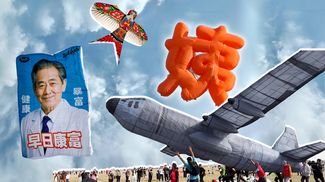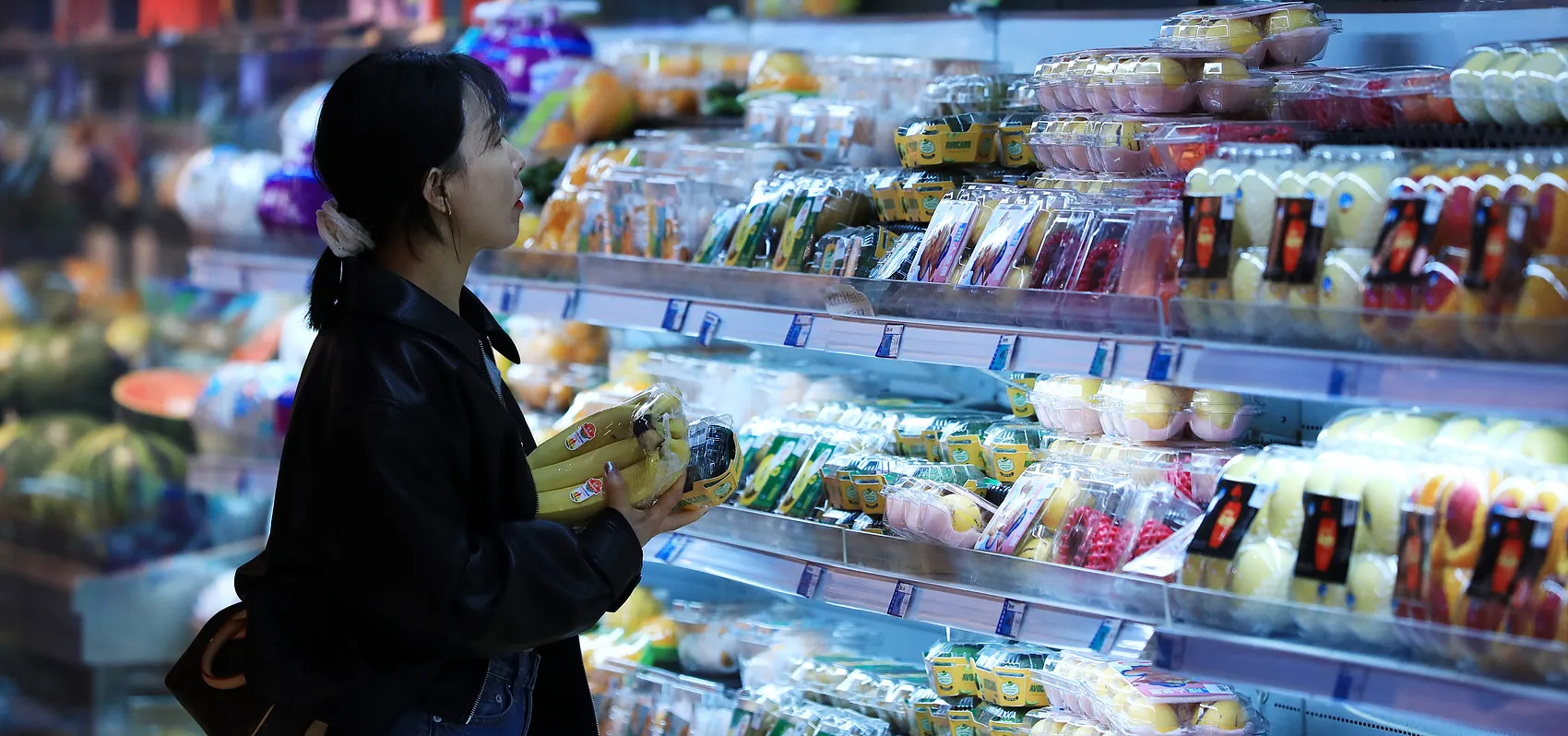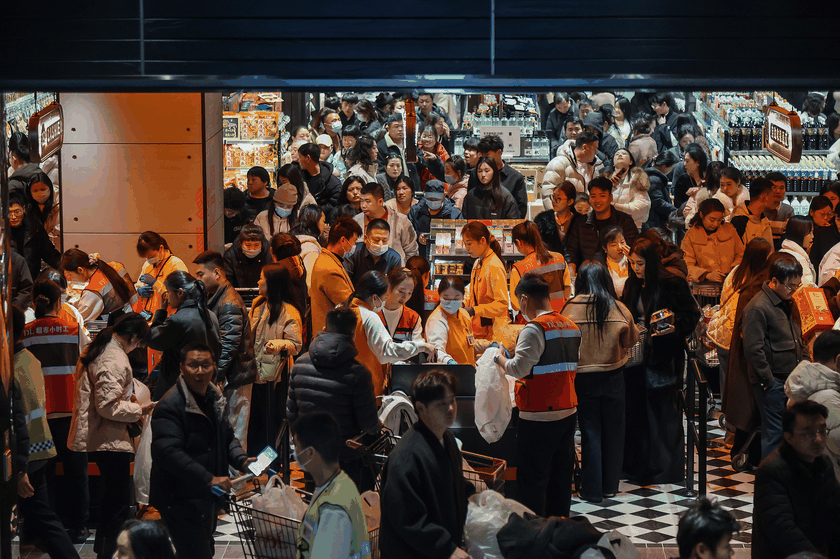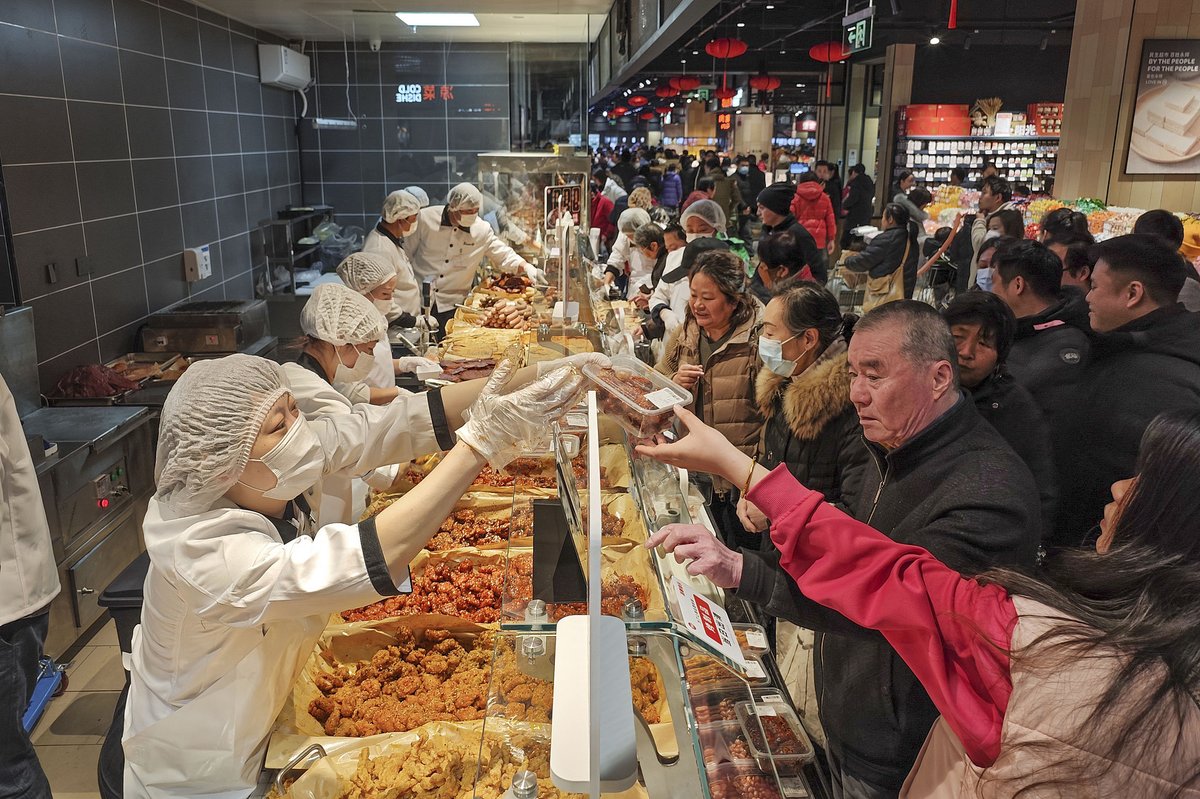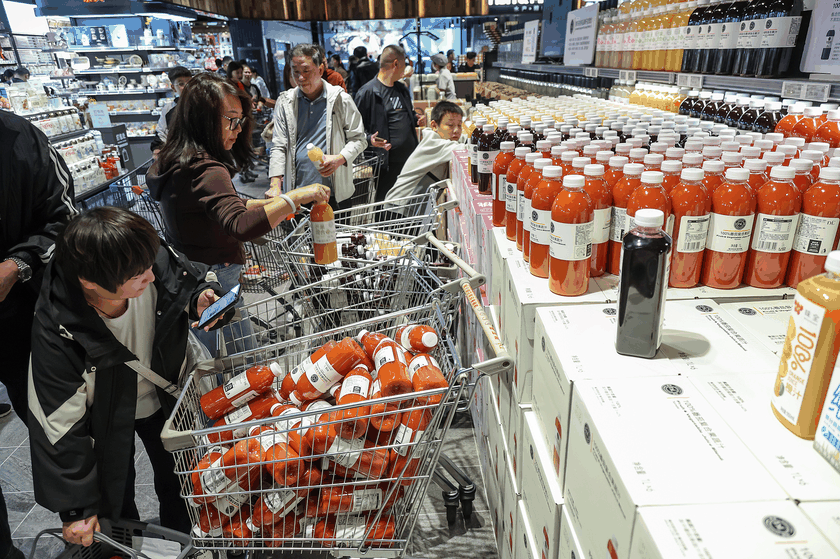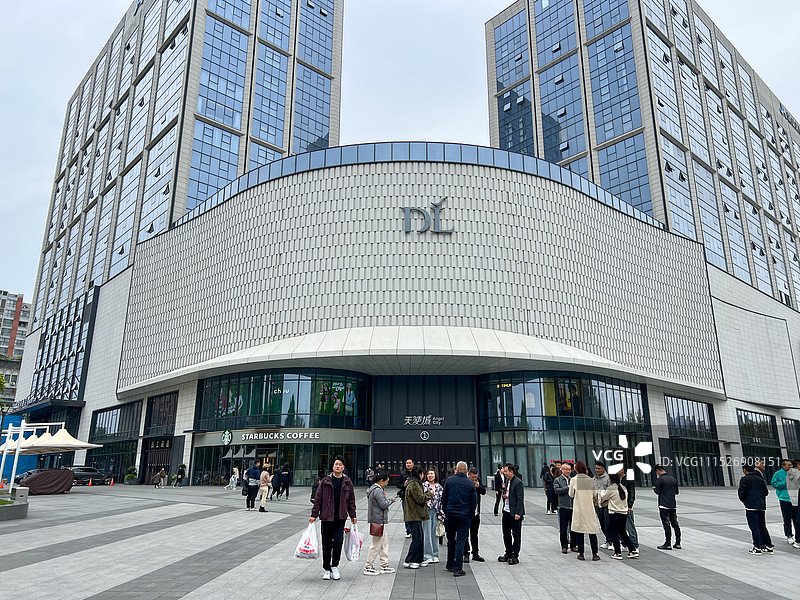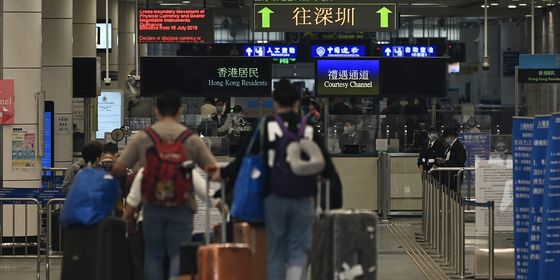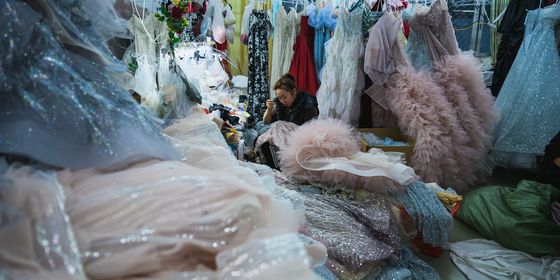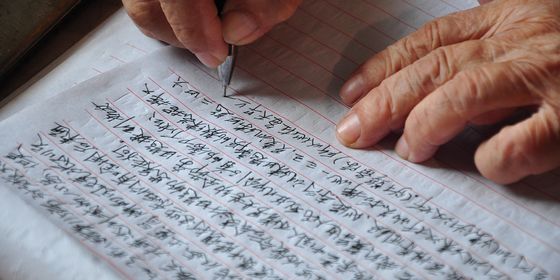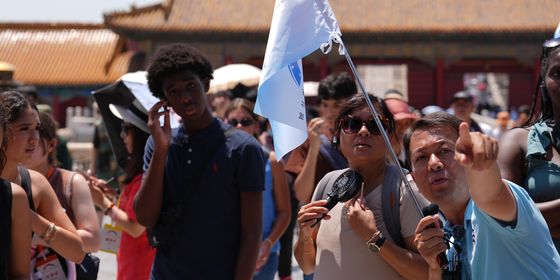Despite the economic downturn, Pangdonglai, a once-obscure regional supermarket, is thriving—yet its success may be difficult to replicate
Last December, Liu Yi drove over 700 kilometers from Beijing to Xuchang, a city in central China’s Henan province that until recently was mostly known for making wigs. Her destination was a supermarket called Pangdonglai, where she had a simple mission: to buy bean sprouts.
“At just 1.8 yuan per package, you get bean sprouts without any additives,” says the 31-year-old, who asked to use a pseudonym for this piece. But she found plenty more to excite her at Pangdonglai, besides a reputation for quality and food safety: magnifying glasses for senior shoppers to read labels, rest areas for pets, patient employees, and free parking—all making the hours-long drive, plus the additional hour she spent in the check-out line, worthwhile. “The employees...help pack your groceries and answer all your questions. You can clearly see how much everything costs, unlike online platforms where they show different prices for different people.”
Millions of visitors like Liu are flocking to Xuchang, a city of over 4 million people, to see this legendary supermarket firsthand, giving it the nickname “National 6A Tourist Destination” after the 1-to-5 rating system for tourist sites around China. At a time when the retail landscape in China is undergoing a crisis—with multinational giants like Carrefour closing stores and customer spending continuing to tighten due to economic pressures—this local retailer in an obscure regional city has defied the odds with its reputation for considerate service, strict quality control, fair prices, and employee benefits.
Discover more about consumer trends in China:
- The Young Chinese Lottery Shop Owners in It to Win It
- As China’s Russian Goods Stores Proliferate, Just How Russian Are They?
- How Baijiu Reinvented Itself for Chinese Youth
Pangdonglai’s founder, Yu Donglai, was a middle-school dropout from a village in Xuchang who opened a tobacco shop in 1990, but got arrested for selling unlicensed cigarettes. In his second foray into retail in 1995, he made nearly a million yuan in his first year with promises of “satisfaction or refund” and “trade quality with good faith.” This shop eventually became today’s Pangdonglai, at one time one of Xuchang’s biggest commercial complexes, offering an all-in-one stop for shopping, entertainment, and dining. It has also expanded beyond groceries into clothing, medicine, and home appliances.
In the meantime, China’s retail scene has been facing a major shake-up. The economic downturn, combined with a sluggish consumer spending environment, has pushed customers toward cost-effective products in low-tier markets. Traditional supermarkets are struggling to retain customers, suffering from overly similar products and poor service. E-commerce and livestream platforms have won over customers with cheaper, faster, and more convenient shopping experiences, despite constant whistleblowing scandals for price discrimination. In 2024, as Walmart and Taiwan’s RT-Mart were shutting down locations across the Chinese mainland, Pangdonglai made nearly 17 billion yuan in sales, according to Yu’s account on Douyin (China’s version of TikTok).
Amid growing distrust in corporate practices and frequent scandals, Pangdonglai has become a rare symbol of reliability and transparency for loyal customers like Liu. In June of last year, when a customer reported unsanitary conditions at a noodle supplier for Pangdonglai, the company rewarded the whistleblower 100,000 yuan and refunded 1,000 yuan to each affected customer, totaling over 8 million yuan in compensation. “Other companies might just deflect responsibilities and drag their feet, but Pangdonglai stepped up,” Liu enthuses. “You can also see detailed inspection reports for every product. It’s quite a relief to know where your products come from and whether they’ve been properly examined.”
Hu Jing, a stay-at-home mother in her 30s, recently drove over an hour from nearby Luoyang to shop at Pangdonglai for the second time. She came for essentials like Pangdonglai’s self-branded laundry detergent, but left impressed by the customer care. On one visit, when her daughter accidentally pressed the emergency call button in the restroom, a staff member immediately came to offer a sanitary pad. “The staff didn’t ask awkward questions—they just helped. It felt natural and respectful,” she shares.
Much of Pangdonglai’s success comes from its self-built supply chain. In lieu of wholesalers or middlemen, the company works directly with factories and farms to develop its private-label DL (Donglai) products, which it claims can help cut costs and maintain quality control. It also forgoes the typical “backstage fees” common in China’s retail industry—like shelf-placement charges or promotional kickbacks—and caps profit margins on fast-moving consumer goods at 30 percent. For example, a shirt sold at Pangdonglai lists a purchase price of 84.6 yuan, excluding overhead costs, while the retail price is set at 118 yuan, with a gross profit margin of 28.3 percent.
Since the early 2000s, Pangdonglai has worked with three other Henan-based retailers to develop its own supply chain, contributing to higher gross margins—30 percent in 2020, according to Southern Weekly, far above its competitor Yonghui’s 21 percent. Nearly 30 percent of its 800 million yuan in annual revenue came from its self-branded products, claimed founder Yu during a training course for CEOs in 2024. Although other supermarkets are keen on developing their own brands, few have earned genuine customer loyalty. “They just lack distinctiveness,” says Hu, referring to the Yonghui store in her city.
When TWOC visited Pangdonglai in Xuchang on a Saturday morning in December, dozens of eager shoppers already lined up for the 9:30 opening. A line of vehicles stretched hundreds of meters, waiting to enter the parking lot. Only on Tuesdays, when the store is closed, does the chaos die down, a local driver told us.
Inside, employees were busy replenishing the shelves. On the Chinese lifestyle app Xiaohongshu, there are more than 1,600 posts calling the retailer a “dream employer,” citing the benefits enjoyed by its 8,300 employees, such as 30 days of annual leave (compared to five days offered by typical Chinese enterprises). But not all of the company’s “family-like” corporate culture has been well received. In November, founder Yu mandated that all employees should refrain from requesting or paying bride prices during marriage negotiations, keep the wedding modest, and limit banquets to a maximum of five tables to “lead a civilized life.” “This feels like a blurring of boundaries between company policy and personal life,” complained a user on microblogging platform Weibo.
As the retailer’s reputation grows, many are profiting from a new business model: reselling Pangdonglai products. While Pangdonglai has yet to open any outlets outside of Henan, supermarkets across the nation have begun stocking its goods, though whether through official partnerships or unofficial channels remains unclear. “I could buy [DL] beers in Zhangye, but not in Pangdongai itself,” says Chen, recalling a store in Gansu province with an entire section dedicated to DL products.
On Taobao, hundreds of shops sell DL-branded beer and jewelry at double the original price, and a news account on Douyin claimed that one reseller can earn up to 150,000 yuan per month. For locals who used to frequent Pangdonglai, this has made the products they relied on scarce and less affordable. “Some people just rush to fill the carts with everything on the shelves,” says Chen Tiankun, a millennial tour guide from Xuchang who used to stop by Pangdonglai every day after work before the tourist surge around 2021. “It’s nearly impossible to find what you want. There are just too many resellers, and they’ve got a monopoly. They’re always hovering near the tea section, asking if you want any tea. It’s quite sickening.”
In response, the retailer introduced purchase limits on high-demand items, such as capping viral mooncakes at two sets per customer card per day, but rampant reselling through unofficial channels remains an ongoing issue.
Yet Pangdonglai’s model isn’t easily replicated, especially in the long run. Many analysts attribute the business’s success to its corporate culture, founder Yu’s personal charisma, and its commitment to staying regional over aggressive expansion—it has shut down profitable locations simply due to the lack of capacity, and provide products and services tailored to local purchasing power and consumption, explained retail expert Zhuang Shuai to the media outlet Dingdiao last October. “The money [other retailers] save from expansion can be used to improve service, increase salaries, and invest in product research,” he added.
With major players like Wumart and Yonghui eager to learn from its success, this has provided Pangdonglai with new business opportunities. Since 2023, Yu has been offering a training program, with 100 entrepreneurs nationwide signing up and paying 100,000 yuan per person. The results have been tangible but short-lived. A Wumart near Liu’s home in Beijing, after adopting reforms like wage increases, raked in over 1 million yuan on re-opening day. The buzz quickly waned, though, as few real changes were made beyond simply changing its stock to resemble Pangdonglai’s and raising salaries up to 30 percent.
Chen has similarly benefited on a smaller scale, organizing “educational trips” for entrepreneurs in Xuchang to explore the inner workings of the company. “It’s like a pilgrimage for them,” he explains. “Some people can’t believe that a supermarket can uplift an entire city, while others are keen to learn the strategies.” On peak days, Chen has guided over 300 business tourists, each paying nearly 1,000 yuan, on visits to the shop to learn about Pandonglai’s accomplishments and business strategies.
Not everyone is convinced by the imitators. Hu, the stay-at-home mom who regularly makes the hour-long drive to shop at Pangdonglai in Xuchang, still dreams of a store opening closer to home. Liu had been excited to see her local Wumart renovated in Pangdonglai style, but after several visits, she’s left wanting more. “Real change is not a decoration campaign. I’m hoping for better services and fair prices in the supermarket—not just new signs and slogans,” adds Liu.

